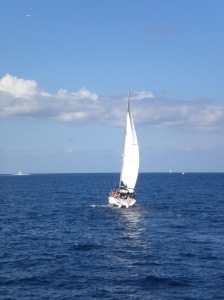Posted by Cila Warncke

Walking to heaven
On a time-killing impulse I went to London’s legendary
Prince Charles Cinema yesterday afternoon (my flight home wasn’t till five PM), bought a £10 annual membership and a ticket to the only thing showing between half-one and three:
Man On Wire.
Not as grammatically challenged as it sounds, the documentary takes its title from report filed by baffled NYPD officials after they arrested puckish artiste Philippe Petit when he finally stepped off the cable he and an audacious band of companions had illegally strung between the two World Trade Center towers.
“I observed the tightrope ‘dancer’ — because you couldn’t call him a ‘walker'” a sturdy-joweled cop tells reporters in the aftermath. It was as close as any American commentator got to describing what it was Petit was doing 104 floors above the pavements of New York.
Petit himself, a passionate, charismatic, voluble character, gives the most Gallic of shrugs and says words to the effect: I had been walking in heaven and all the Americans could ask was ‘why?’ There was no ‘why’.
It was a grand gesture, life as objet d’art. The documentary interviews, at length, everyone immediately involved in the unforgettable event: Petit, his then girlfriend Annie, his best friends Jean Louis and Jean Francoise, Pete (Australian) and John (American) who helped rig the wire, as well as Barry the ‘inside man’ and Alan and David, all Americans who helped the little gang of French who they – more than 30 years later – still clearly think a bit mad.
The contrast between the French and American Weltanschauung is profound and powerfully affecting. Petit describes his first encounter with the two towers – in an artist’s rendering in a magazine. I had found my dream, he says. That his dream was impossible, life-threatening, ludicrous and (most confusingly for their reluctant American helpers) non-profitable was of absolutely no concern to his friends and lover. Jean Louis, handsome and articulate, breaks down at the end of the film — apparently their friendship didn’t survive the supreme emotional peak of the experience. Annie, possessed of vibrant green eyes, also weeps describing the moment of Philippe’s triumph. She later says, without regret: our relationship ended that day. Good-humoured Jean Francoise, who was deported for his part in the adventure, is equally non-judgemental. Each sacrificed for their friend’s dream yet there is no regret, no obligation, much less anger or bitterness.
David and Alan, the Americans who were briefly involved, couldn’t be more different. Their incomprehension of the whole affair is stamped across their faces. David fled halfway through helping them smuggle supplies into the towers, ending his role in the story early. Alan stuck it out a little longer, but eventually abandoned Jean Louis on the rooftop because he thought it was ‘impossible’. What they saw when Petit lounged gracefully on the wire, 450 metres in the air, it wasn’t art or communion with the heavens — just some daft frog showing off. Watching them, you suspect that if Petit had told them he was trying to get in the Guinness Book of World Records, or that he were being sponsored by a major corporation they would have ‘got it’. If Petit had gone up and waved a French flag they might have understood. Exploration without conquest remains too alien a concept for literal American minds.
Man On Wire ends with the now-60-year-old Petit walking with calm, rapt concentration along a wire. His final words incite rebellion, he says: don’t rest on success, live every day as a challenge. Not against rules outside, necessarily, but against fears inside.
Share It
















